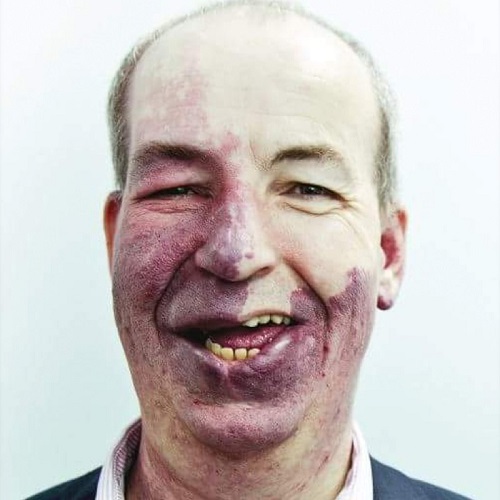Phil was born with a birthmark that covers three quarters of his face and parts of his body. Growing up it wasn’t something that his family really talked about.
“It wasn’t really discussed by my family until I was about eight years old. They took me to a camouflage make-up artist and bought me some cream that matched my skin tone. At first I was quite excited but I got bored while it was being applied. I found it too much hassle and so never really wore it.”
It was about that time that the bullying started, and got progressively worse, especially when he moved up to senior school.
It’s taken seven or eight years for me to deal with that stuff so that it doesn’t affect me as much. I have coping strategies now.
“It was horrific. Relentless. I would have people throw things at me, call me names, and draw my picture on blackboards. A teacher once tried to step in but they got berated by the other students. That was the only time I ever remember a teacher trying to protect me.
“If I walked down the street, people would do a double take. Children would ask questions about what was wrong with my face. I’d avoid being seen, and walk with my head turned away or I’d take a different route that wasn’t so busy. It made me very introverted and shy.”
Phil never talked to anyone about what had happened, and for many years, didn’t realise how much the birthmark and people’s reactions to it had affected him. Then when he was in his 40s, he realised something was wrong after he and his wife experienced relationship difficulties.
“We ended up going to counselling together and it all came out. That’s when I first contacted Changing Faces; they were a big help. It’s taken seven or eight years for me to deal with that stuff so that it doesn’t affect me as much. I have coping strategies now.”
Since leaving school, Phil has enjoyed a successful career, including spending 20 years working in logistics at DHL. However, before DHL he experienced a lot of discrimination and abuse.
“I once had an interview with a water company and the man interviewing me said ‘I’ve noticed your face, is that anything that can get in the water?’. I explained that it was just a birthmark. Unsurprisingly I didn’t get the job. At the time, I was trying to get a job so I stayed professional and polite, but it wasn’t until afterwards that I realised I was being discriminated against.
“Then I had an interview at a company that fitted satellite dishes and TV aerials, where the man said ‘I can’t employ you. I couldn’t send you out to a customer with a face like that’. I found that really upsetting.”
Phil feels strongly that companies need to do much more to educate their staff about people who have a visible difference to make sure that they treat them fairly and responsibly as both staff and customers. He cites a time when he went to get his eyes tested at Specsavers as an example.
“I got such a negative reaction from the shop that when they asked me for feedback, I told them exactly what had happened and how it had made me feel. Within an hour, their clinical director had phoned me up to apologise. That was such a strong response and showed they had taken my complaint very seriously.
I’ve never reported the abuse as I didn’t know it was a crime, I didn’t know it was something the police would take seriously. People need to be aware of what they can or can’t do and we need to put a stop to the abuse.
“With Changing Faces’ help, I was able to work with Specsavers to help them change their staff training materials so that incidents like that wouldn’t happen again. They followed through with everything we discussed, it was brilliant.”
Phil says while he has never reported any of the abuse he’s experienced as a hate incident or hate crime he wishes he had known that he could and would urge others to do so.
“If I’m on my own and I get called names and experience abuse I just bury it but after 45 years of doing that I just fell apart. There is an old saying ‘sticks and stones may break your bones but names will never hurt you’ but names can really harm your mental health.
“I’ve never reported the abuse as I didn’t know it was a crime, I didn’t know it was something the police would take seriously. People need to be aware of what they can or can’t do and we need to put a stop to the abuse.”
Phil says that one of the things that has helped him the most is being able to meet other people who also have a visible difference.
“Having the opportunity, through Changing Faces, to speak with someone else who has a birthmark and knows what it’s like, was very therapeutic. Knowing you’re not alone and connecting your experience with someone else’s – that’s so powerful.”
